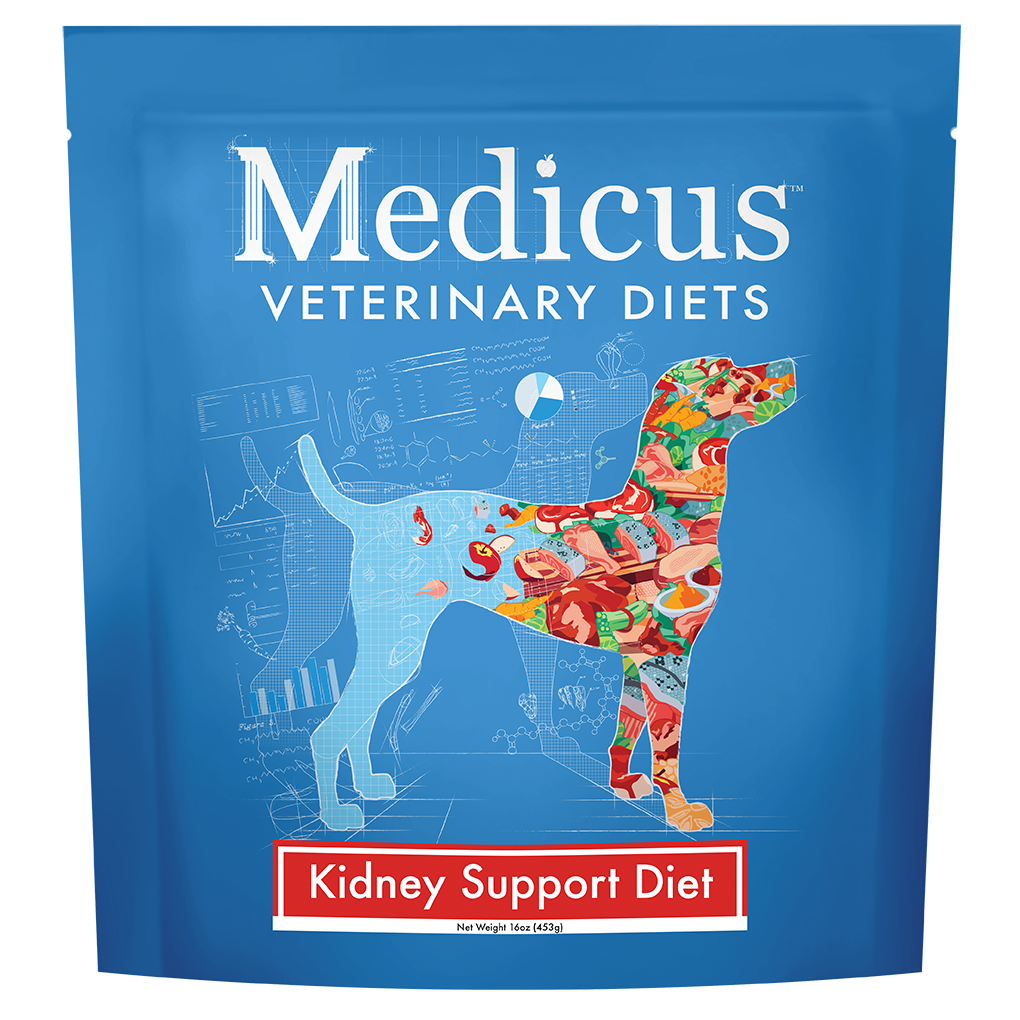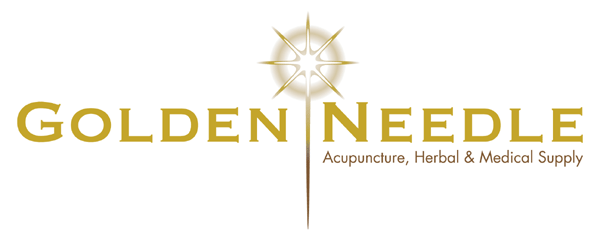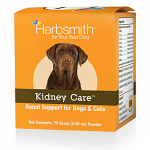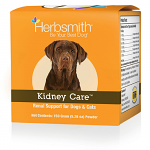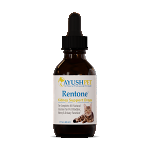Medicus Kidney Support Diets for dogs are therapeutic meals designed to provide the nutritional framework for the unique nutritional needs of a CKD dog.
Diet Overview
Designed to nourish the body and protect the kidneys by lessening their workload. The Medicus Canine Kidney Support Diet is formulated with real whole foods chosen by design for their form and function.
Highlights
- Moderate levels of high-quality, bioavailable animal-based proteins
- Reduced phosphorus
- Natural phosphorus binders
- Healthy levels of potassium
- High levels of B vitamins
- Optimal ratio of healthy fats
Who would benefit from this diet?
- Chronic Kidney Failure with or without azotemia
- Acute Kidney Failure
- Conditions Requiring Low Dietary Phosphorus
How It Works
The Medicus Canine Kidney Support Diet is meticulously crafted to address these key nutritional needs:
Nourishes the Body with Clean, Whole Food
- Moderate levels of high-quality protein from meat and organs
- Moderate levels of healthy fats
- Antioxidants
- Moderate levels of high-quality protein from meat and organs
- Moderate levels of healthy fats
- Antioxidants
Limits the Nutrients that the Kidney has to Process
- Low phosphorus ingredients for reduced phosphorus intake
- Chitosan and egg shells bind phosphorus in the gut
Replaces Nutrients challenged by increased urination
- Added Potassium and B vitamins
Supports Crucial Kidney Function
- Omega-3 fatty acids – Omega 6:Omega 3 Ratio 0.52:1
Beef
Red meat generally is lower in phosphorus than white chicken, turkey, or fish meat. Beef also offers nutrients like protein, the building block for muscles, ligaments, skin, and cell maintenance, and provides energy.
Rice
Rich in fiber and antioxidants, but more importantly, a low phosphorus grain, helping to limit phosphorus intake.
Egg
The egg itself is a complete protein, meaning it has all 9 amino acids the body needs from food and is low in phosphorus.
Beef Liver & Kidney
Liver contains 10 to 100 times the nutrients found in a serving of muscle meat. Kidneys provide a large percentage of a dog’s necessary daily vitamin intake.
Flaxseed
Full of polyphenols, an antioxidant that defends against oxidative stress to decrease inflammation.
Sweet Potato
These root vegetables offer fiber, beta-carotene, and antioxidants, including vitamin C.
Ground Krill
Brimming with nutrients including marine proteins, essential fatty acids, and a powerful antioxidant called astaxanthin, the combination is a powerful anti-inflammatory.
Blueberries
One of the most popular superfoods known for their antioxidant properties and ability to limit oxidative stress, which fights inflammation.
Beets
With Vitamin C, fiber, manganese, folate, and potassium, beets are packed with micronutrients that benefit the immune system and help fight inflammation.
Potassium Salt
Used as an electrolyte replenisher to ensure adequate potassium levels.
Ground Egg Shell
The shell is rich in calcium carbonate, which binds phosphorus in the gut so it can be eliminated.
Chitosan
Comes from the outer skeleton of shellfish like lobster, crab, and shrimp. It binds to phosphorus, which gets eliminated. It’s a natural way to manage phosphorus levels.
Cod Liver Oil
A whole food source of vitamin D and rich in anti-inflammatory Omega-3 fatty acids EPA and DHA.
Kelp
Naturally high in antioxidants with anti-inflammatory properties, and it’s a natural form of iodine.
Mixed Tocopherols
Part of the vitamin E family (akin to vegetable oil) & often used as a natural preservative to maintain freshness.
Zinc Proteinate
A chelated mineral bound to an amino acid that protects against oxidative stress.
B Vitamins
Niacin, Riboflavin, Thiamine, Vitamin B12, Pyridoxine, and Folic Acid are incredibly fragile B vitamins. They help a variety of enzymes do their jobs, so food more easily turns into energy in the body.
Calorie Content
4,253 kcal/kg | 421 kcal/cup
Cups In A Bag
99 g/cup | 4 1/2 cups/lb
Feeding Guide
Always consult your veterinarian before introducing this diet to your dog. Start with these daily feeding guidelines and follow your veterinarian’s suggestions about the number of meals per day and whether the daily recommendation is right for your dog.
REHYDRATION RECOMMENDED
Water helps with digestion, circulation, and other bodily processes like perfusion (movement of fluids through the organ), which helps move the harmful byproducts through the filtration system and out of the body.
Palatibility Suggestions
Consult with your veterinarian before following these suggestions. Every dog and their condition is different, so it is best to learn whether the recommendations and ingredients are right for them.
Chicken Bone Broth
Hydrate your dog’s food with chicken bone broth (no sodium) as a nutritious and enticing way to add moisture and flavor. Bone broth sits well in a dog’s stomach so it is perfect for dogs with decreased appetite.
Sardines
Place a sardine on top of your dog’s meal. They are rich in Omega 3 fatty acids, which have been shown to slow the decline of kidney function associated with kidney conditions.
Kefir
Hydrate your dog’s food with kefir, which contains probiotics, beneficial enzymes, and vitamins B & K. It is also a great source of calcium.
Day 1-2
Feed 25% | 75%
Medicus | Current Food
Day 3-4
Feed 50% | 50%
Medicus | Current Food
Day 5-6
Feed 75% | 25%
Medicus | Current Food
Day 7
Feed 100%
Medicus
|
